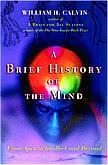|
COPY-AND-PASTE CITATION William H. Calvin. What are the three most significant "trends" of the past decade? Pre-paper for Humanity 3000. Foundation for the Future. (October 2005). See also http://WilliamCalvin.com/2005/Humanity3000.htm |
William H.
Calvin |
|
William H. Calvin Q: What are the three most significant "trends" of the past decade? Implications of these trends for the future of humanity; A) Over the next decade? B) Over the longer-term? Global Climate Change. It has been 40 years since warnings of gradual warming, and the weather of the last decade has finally made some take notice of the scientific warnings. They have emphasized that a few degrees of warmth are not the only problem. As the recent hurricanes have shown, more severe weather events will stress urban centers. Katrina-scale catastrophes may become common in the 21st century. Currently, there simply isn’t the infrastructure to handle massive rescues and relocations. We have had less than ten years to digest the news of the many abrupt climate changes of the past that created worldwide severe drought. The most recent one was back at the dawn of agriculture; another one will be a civilization-busting event unless we become far more resilient. Unfortunately, the warming and weather severity trends are just the sort of thing to trigger another abrupt worldwide drought and its associated cooling (take some that water vapor out of the air and the greenhouse thermostat drops a few degrees as water vapor is the major greenhouse gas, 2/3 of the total). Since a major part of the climate change occurs within just five years, civilizations must redesign themselves for bouncing back when something happens – or they will become massively dysfunctional. The downwards spiral will cause a human population crash. Besides drought, there are many other things that will test our preparedness: the next influenza pandemic, bioterrorism, and economic crashes. The Internet Explosion. In 1995, the first full-text and free search engine appeared, as did the first major web-based bookstore, Amazon.com. Email was still mostly for academics. Only ten years later, many people are extensively exploiting this enhanced connectedness. Indeed, adoption of the internet for commerce and even telephone service is rapidly making the internet another place where disruption-based economic warfare can be waged secretly and from a distance. Genomics. The word didn’t even exist a decade ago when the first bacterial genome was completely sequenced. Now we are comparing the chimpanzee genome to the human one, looking for clues as to why tumors and blood vessel problems are the big killers of humans but not chimps. If our killer diseases are side effects of our rapid evolution in the last several million years, the comparison may give us some good ideas for gene therapy to try out. Like the internet explosion, there are many new directions that this one might create. I can’t forecast it any better than I could predict the popularity of the web, despite being immersed in the pre-existing internet culture. ––– Leads and Lags. One of the problems with both the internet and genomic blossoming is the speed. Their problems have to be addressed by public discourse and governmental decisions, which often take decades to reach a consensus – during which time the economy becomes so dependent of the new ways of doing things that making changes is seen as difficult and risky.
other authors' books (and who has quoted them):
|
A Brief History of the Mind, 2004 Lingua ex Machina 2000 The Cerebral Code 1996 How Brains Think 1996 |






